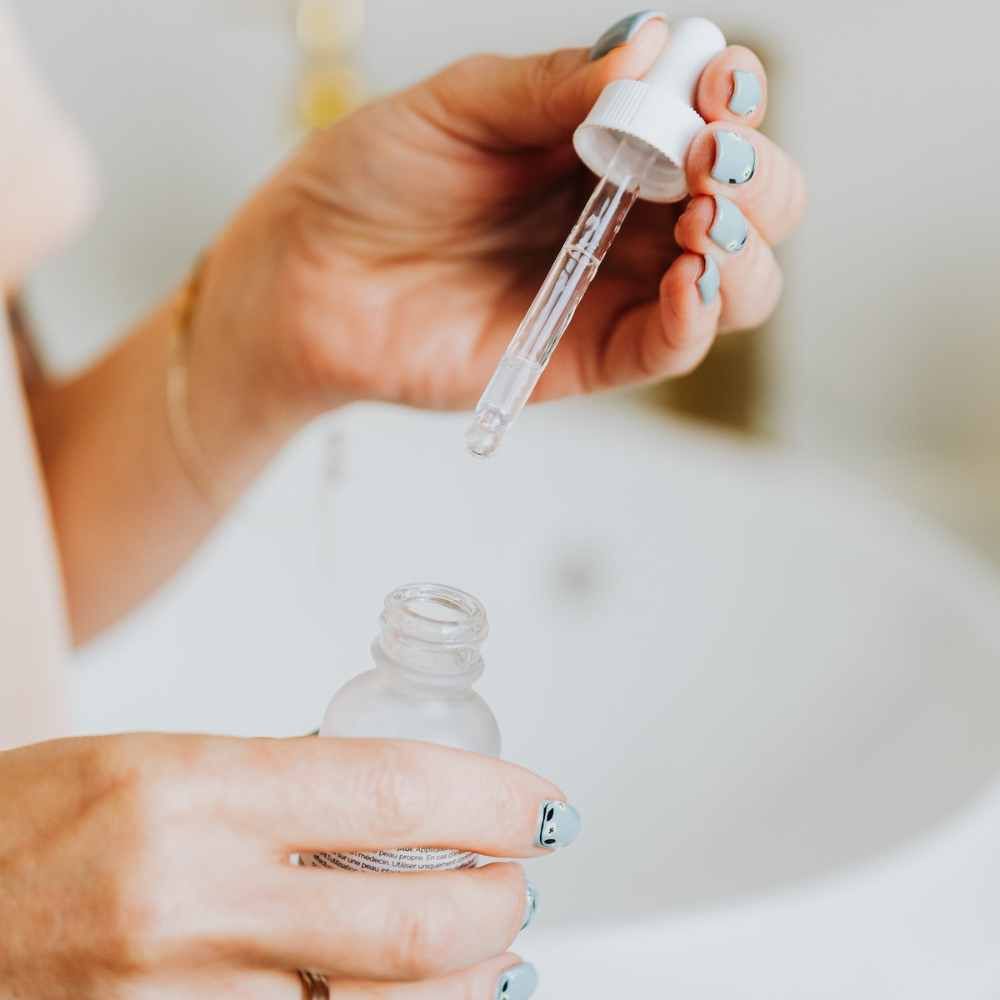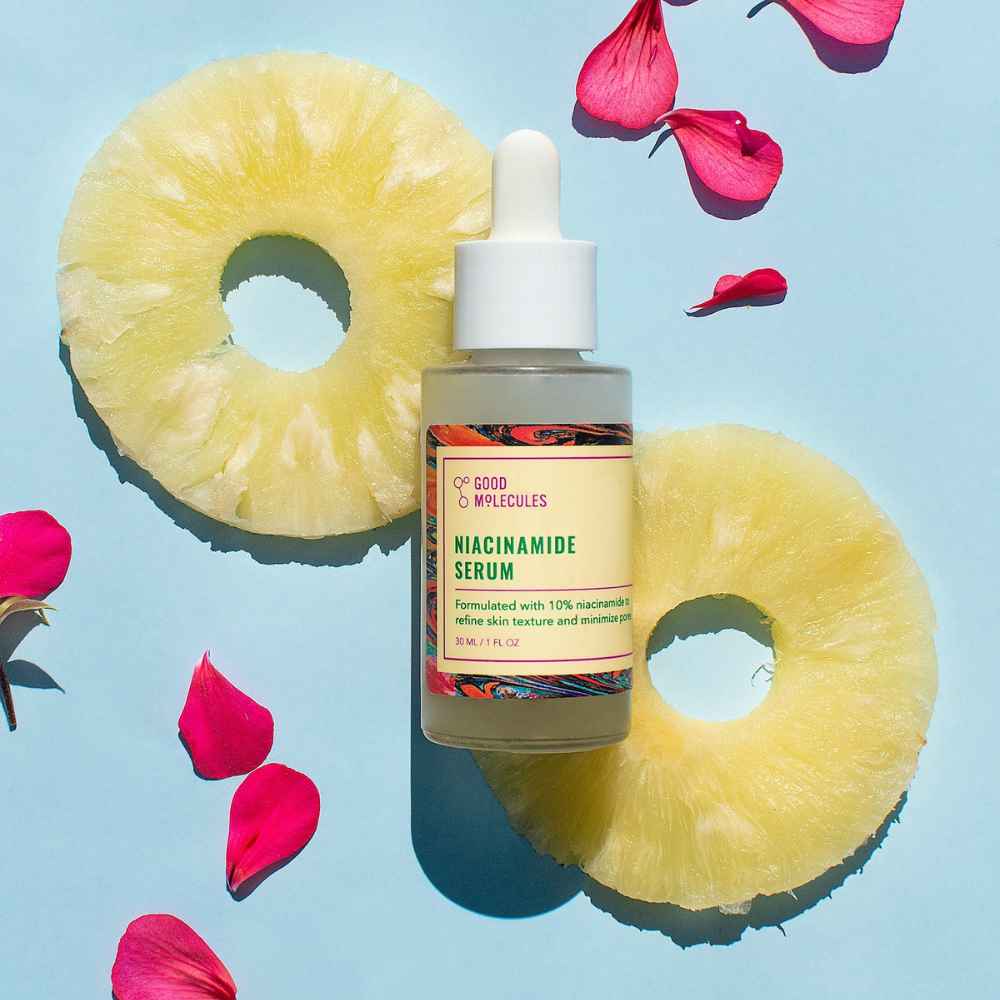
Is Niacinamide Good for Oily Skin? We Asked Dermatologists!
It’s no secret that having oily skin can be frustrating. But, if you’re looking to add a new weapon to your skincare arsenal, you may want to consider niacinamide.
Whether you’ve heard of it or not, this ingredient has been gaining traction as one of the most effective ways to combat oiliness and breakouts in blemish prone skin.
So, what is niacinamide and is it good for oily skin? Keep reading to find out what dermatologists have to say about it.

What Is Niacinamide?
Niacinamide is a form of vitamin B3—also known as nicotinic acid—that works in tandem with other vitamins and minerals in order to promote healthy skin cells.
It helps keep the skin barrier strong and helps it retain moisture while also protecting against environmental damage.
Because of its ability to control sebum production, niacinamide is widely used in skincare products specifically designed for people with oily skin.
How Does It Work?
Niacinamide is great for many skin concerns. It works by inhibiting the transfer of oil from the glands to the surface of the skin—which means less breakouts and fewer greasy patches throughout the day.
That inhibition also reduces inflammation caused by excess sebum buildup on the face, which can lead to redness or irritation.
In addition, niacinamide has antioxidant properties that help protect your skin from environmental toxins like cigarette smoke or UV rays.
Finally, niacinamide encourages cell turnover which helps keep pores clear and reduces oiliness over time.
Is Niacinamide Good for Dry Skin?
Yes, Niacinamide is an effective and safe way to improve the health, appearance and radiance of dry skin.
Studies have shown that topical application of niacinamide to dull skin can reduce visible signs of aging, such as wrinkles and fine lines, as well as hydrate the skin by increasing natural ceramides in the upper layer of your skin.
It also has antioxidant properties that help protect against environmental damage caused by free radicals.
Is Niacinamide Good for Rosacea Prone Skin?
Yes, niacinamide is considered a safe and effective treatment for rosacea.
Niacinamide helps to reduce inflammation and redness in these skin types by decreasing the size of blood vessels in the skin.
There are several studies that found that niacinamide is more effective than traditional topical treatments for treating mild to moderate cases of rosacea.

What Products Contain Niacinamide?
You may have seen niacinamide listed on your skincare product labels without even realizing it!
This ingredient can be found in many popular moisturizers, serums, cleansers and sunscreens that are marketed towards people with oily skin or acne prone skin.
Look for products that list “niacinamide” as an active ingredient (as opposed to “vitamin B3”), since products with higher concentrations of this vitamin tend to be more effective at treating oily complexions.
Additionally, some makeup primers contain this ingredient—which makes them perfect for keeping shine at bay throughout the day!
Can You Use Niacinamide with Hyaluronic Acid?
Yes, you can use niacinamide and hyaluronic acid together in your skincare routine!
Both compounds have distinct benefits when applied topically to the skin. Niacinamide is a form of vitamin B3 that plays an important role in several cellular processes within the body, such as regulating sebum production and helping to repair damaged skin.
Hyaluronic acid is a naturally-occurring sugar molecule found in high concentrations within the dermal layer of our skin which helps retain moisture - leading to an improved complexion and reduced appearance of wrinkles.
The combination of niacinamide and hyaluronic acid has been shown to be especially effective for people suffering from dry skin or sensitive skin, as well as those looking for anti-aging benefits such as reducing wrinkles.
The two ingredients are both rich sources of hydration which help prevent transepidermal water loss (TEWL), leaving your skin feeling supple, smooth and soft.
Furthermore, they work together synergistically - while niacinamide can reduce oil production thereby diminishing blemishes on oily skin, this acid provides additional hydration without making it feel oily or greasy while also protecting it from environmental stressors like UV radiation.
If using both elements simultaneously make sure you always apply them separately at different times – first use your niacinamide product followed by the one containing hyaluronic acid about 10 minutes later so that each ingredient has time to properly penetrate into your pores before you move on with applying other products afterwards.

Can You Use Niacinamide with Salicylic Acid?
Yes! In fact, niacinamide and salicylic acid are often used in combination for their synergistic effects.
Niacinamide is a form of Vitamin B3 that has anti-inflammatory, antioxidant, and hydrating properties.
It helps improve the overall health of skin while also evening out pigmentation, lightening dark spots, and reducing pore size.
This acid is a beta hydroxy acid (BHA) derived from willow bark that is an excellent exfoliator which can help clear breakouts, reduce oiliness on the face, and minimize the appearance of pores.
Combining them together can give you powerful results in terms of improving skin texture as well as brighten dullness or discoloration caused by sun damage or age spots.
When using both products together it's important to be mindful about timing - applying niacinamide first and then waiting for it to absorb completely before adding this acid into your skincare routine.
This prevents any potential irritation from occurring due to low pH levels.
Both ingredients have different pH levels when applied at once directly on top of each other in your regimen can cause sensitive skin issues such as burning or stinging sensation when applied simultaneously on the same spot.
Additionally make sure to always use SPF after all your other serums.
This ensures you continue protecting your skin against photoaging aging even if you’re using products containing acids like salicylic acid or glycolic acid during daytime hours.
Can Niacinamide Prevent Aging?
Yes, niacinamide can help to prevent skin aging in several ways.
It is a powerful antioxidant that helps to reduce the appearance of wrinkles, sagging skin, and age spots; it also helps boost collagen levels and elasticity resulting in firmer skin.
Niacinamide helps to inhibit melanosome transfer from melanocytes and this reduces pigmentation caused by excess sun exposure which is often a contributor to signs of aging.
Furthermore, niacinamide can also increase ceramide production which leads to increased hydration, skin elasticity and plumpness in the skin.
Thus, overall it can be seen that niacinamide has a multifaceted approach towards preventing signs of aging on the skin.
Dr. Mark, a dermatologist, demonstrates the benefits of niacinamide in this TikTok video:
@dermarkologist Do you NEED to be using niacinamide? #oilyskin #acneskincare #poresize #skincareroutine #dermatologist oily skin acne treatment how to reduce pore size
♬ CUFF IT - Beyoncé
Say Yes to Niacinamide
So there you have it—everything you need to know about the benefits of niacinamide!
If you’re looking for an effective way to reduce breakouts and keep your skin tone looking matte all day long, then give niacinamide serums a try!
Not only does it work wonders on oily complexions but it can also help protect your skin from environmental damage and encourage cell turnover for a smoother complexion overall.
Regardless of what type of skincare routine you follow or what kind of lifestyle you lead—adding topical niacinamide serum to your regimen will benefit all types of complexions!

















